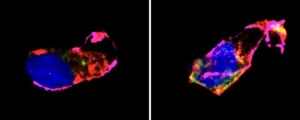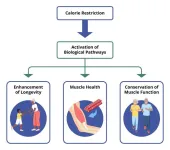(Press-News.org) CHAPEL HILL, NC — A three-year clinical trial funded by the National Institutes of Health and Food Allergy Research and Education (FARE) has shown that the sublingual immunotherapy, or SLIT, is safe in peanut-allergic children ages 1 to 4, with a greater likelihood of desensitization and remission the earlier the treatment began.
Led by Edwin Kim, MD, associate professor of pediatrics at the UNC School of Medicine, this is the first randomized, controlled trial to investigate – in this young age group – the efficacy and feasibility of SLIT, which involves a tiny bit of peanut protein absorbed under the tongue.
The study, published in the Journal of Allergy and Clinical Immunology, included peanut-allergic 1 to 4 year-old children randomized to receive 4 mg peanut SLIT versus placebo. A total of 50 participants (40 at UNC Medical Center, 10 at University of Texas Southwestern Medical Center) were enrolled. Participants were randomized 1:1 with 25 receiving peanut SLIT and 25 receiving placebo. It’s an approach where the treatment is given as a small amount of liquid under the tongue, instead of peanut flour that is mixed with other food and then eaten like it is during oral immunotherapy, or OIT. Desensitization to peanut was assessed by double-blind, placebo-controlled food challenge (DBPCFC) after three years of treatment.
Findings showed that peanut SLIT can be highly effective in treating peanut-allergic toddlers with almost 80% tolerating 15 peanuts without allergic symptoms after completing the treatment. With most typical peanut-allergic reactions being caused by one peanut or less, these results would translate into strong protection against exposures to peanut. In addition, researchers showed that remission of the peanut allergy may be possible after peanut SLIT with 63% of the toddlers maintaining their protection three months after stopping the treatment. These new findings show that early intervention with peanut SLIT is promising and warrants further development.
“From our prior studies in older children, we were optimistic that peanut SLIT could have a similar treatment effect in toddlers,” said Kim, corresponding author of the study, pediatric allergy and immunology division chief and director of the UNC Food Allergy Initiative. “However, what we found was even better. The desensitization levels we saw were higher than expected and on par with levels we normally would only expect with oral immunotherapy. Just as important, rather than wearing off quickly, we were excited to see that over 60% stayed protected three months after stopping the treatment.”
One of the presumed strengths of the SLIT approach when compared to OIT has been its overall safety and simple administration. While most treatment side effects with OIT are mild to moderate, severe reactions requiring emergency treatment do occur and there remains a critical need to develop treatments with more manageable side effects.
“Peanut OIT is currently available and being offered by increasing numbers of allergists, however we are quickly learning that in addition to its known risk of allergic reactions, the actual doing of OIT can be very difficult for many families,” said Kim. “Peanut SLIT could be a good option to consider as it may be able to provide comparable levels of protection while being safe and easier to administer.”
Compared to OIT, the SLIT approach is likely to be a safer option, Kim said, with the most common side effect consisting of oral itching. Treatments that can protect children from allergic reactions while still being safe and practical for busy families can be life-changing, and researchers are hopeful that peanut SLIT can be one of those options.
“Even with the push to introduce peanut in early childhood in order to prevent the allergy, peanut allergy remains one of the most common food allergies,” said Kim. “A result of early peanut introduction is that we are diagnosing peanut allergy at younger and younger ages making it vitally important to develop treatments that can be safe and effective at preventing allergic reactions in these young children.”
Media contact: Brittany T. Phillips, Communications Specialist, UNC Health | UNC School of Medicine
END
For toddlers allergic to peanuts, a tiny bit of protein therapy under the tongue could be the best approach
A clinical study led by Edwin Kim, MD, at the UNC School of Medicine, showed how Peanut Sublingual Immunotherapy (Peanut SLIT) is safe and effective in children ranging from 1-to-4 years of age. Remission of peanut allergy was also possible after three mo
2023-10-13
ELSE PRESS RELEASES FROM THIS DATE:
Study explores how changing autism traits are linked to mental health conditions
2023-10-13
A long-term study by UC Davis Health researchers sheds new light on the relationship between autism traits and mental health in middle childhood. The paper, published in the journal Autism, finds that changes in core autism characteristics are related to whether children develop additional mental health challenges during their elementary school years.
“Our findings suggest that different aspects of a child’s development may affect each other over time,” explained Einat Waizbard-Bartov, a doctoral researcher in developmental psychology at the UC Davis MIND Institute and the lead author on the paper. “Core autism traits and ...
Dan M. Frangopol wins inaugural EuroStruct International Award of Merit
2023-10-13
Professor Dan M. Frangopol is the winner of the EuroStruct2023 International Award of Merit presented by the EuroStruct Executive Committee in recognition of outstanding contributions to bridge and structural asset management and structural engineering.
Frangopol, the inaugural Fazlur R. Khan Endowed Chair of Structural Engineering and Architecture in the Department of Civil and Environmental Engineering at Lehigh, was presented with the award during EuroStruct 2023, the second Conference of the European ...
Not getting enough sleep? Your vascular cells are drowning in oxidants
2023-10-13
NEW YORK, NY--Does this sound like you? You wake up at the same time each morning, get the kids out the door, and rush to catch the subway to work. But at night, maybe you stay up until midnight doing laundry or 1 a.m. to catch up on the bills.
Lots of Americans—about one-third of us—are in the same situation and habitually get only five to six hours of sleep instead of the recommended seven to eight hours.
But even a mild chronic sleep deficit may heighten the risk of developing heart disease later in life: Surveys of thousands of people ...
UMSOM researchers provide first statewide prevalence data on two new emerging pathogens in healthcare settings
2023-10-13
University of Maryland School of Medicine (UMSOM) researchers conducted a statewide survey of all patients on breathing machines in hospitals and long-term care facilities and found that a significant percentage of them harbored two pathogens known to be life-threatening in those with compromised immune systems. One pathogen, Acinetobacter baumannii, was identified in nearly 31 percent of all patients on ventilators to assist with their breathing; Candida auris was identified in nearly 7 percent of patients on ventilators, according to the study which was published this week in the Journal ...
Calorie restriction in humans builds strong muscle and stimulates healthy aging genes
2023-10-13
FOR IMMEDIATE RELEASE: Friday, Oct. 13, 2023
CONTACT: NIAPressTeam@mail.nih.gov, 301-496-1752
Reducing overall calorie intake may rejuvenate your muscles and activate biological pathways important for good health, according to researchers at the National Institutes of Health and their colleagues. Decreasing calories without depriving the body of essential vitamins and minerals, known as calorie restriction, has long been known to delay the progression of age-related diseases in animal models. This new study, published in Aging Cell, suggests the same ...
Deep brain stimulation induces more healthy neurons and sustained memory benefits in Rett animals
2023-10-13
A recent study from the lab of Dr. Jianrong Tang, associate professor at Baylor College of Medicine and principal investigator at the Jan and Dan Duncan Neurological Research Institute (Duncan NRI) at Texas Children’s Hospital shows that deep brain stimulation (DBS) of a specific brain region results in a significant and sustained improvement of memory in Rett mice. Moreover, they found that this treatment promotes the generation of new healthy neurons in these mice.
The study, ...
DOT1L gene variants associated with a new neurological disorder
2023-10-13
A study from the laboratory of Dr. Hugo J. Bellen, a distinguished service professor at Baylor College of Medicine and a principal investigator at the Jan and Dan Duncan Neurological Research Institute (Duncan NRI) at Texas Children’s Hospital, has discovered that gain-of-function variants in the DOT1L gene cause a new disorder. Further studies revealed that the majority of the symptoms in the patients were surprisingly due to an increase in the enzymatic activity of a histone methylase encoded by this gene. This study was published in the American Journal of Human Genetics.
“This project originated when the Undiagnosed ...
New UNCG research will help better predict the health and sustainability of ‘grassy’ ecosystems
2023-10-13
Greensboro, N.C. (October 13, 2023) – Newly published research from UNC Greensboro’s Dr. Kevin Wilcox and colleagues will help scientists better predict how global changes – such as droughts, fires, and heat waves – will impact the health and sustainability of the Earth’s grassy ecosystems.
The article, published October 10, 2023, in Global Change Biology, provides key steps forward to improving mathematical models that forecast changes to our planet’s savannas, prairies, grasslands, and arctic tundras.
“Forest ecosystems tend to get the lion’s share of public ...
Recent UH graduate develops 3D printable prostheses to restore amputees’ finger mobility
2023-10-13
A groundbreaking, easy-to-use 3D printable finger prosthesis created by a recent University of Houston graduate could offer amputees a low-cost solution to restore finger functionality. David Edquilang first designed Lunet, which doesn’t need metal fasteners, adhesives or special tools to assemble, as an undergraduate student at the Gerald D. Hines College of Architecture and Design. While standard prostheses can cost thousands of dollars, Edquilang aims to make his design open access on the internet, instead of selling it.
“Not every good idea needs to be turned ...
American Society of Plant Biologists announces new peer review report policy
2023-10-13
Plant Physiology and The Plant Cell, published by the American Society of Plant Biologists (ASPB), are introducing a new mechanism for publishing peer review reports on each journal’s website.
A version of peer review reports has been published with the supplemental material of original research articles in The Plant Cell for some time. However, for the first time the ASPB Editorial Office is introducing a uniform process for formatting and publishing these reports with Plant Physiology original research articles, as well.
The ...
LAST 30 PRESS RELEASES:
Chimps’ love for crystals could help us understand our own ancestors’ fascination with these stones
Vaginal estrogen therapy not linked to cancer recurrence in survivors of endometrial cancer
How estrogen helps protect women from high blood pressure
Breaking the efficiency barrier: Researchers propose multi-stage solar system to harness the full spectrum
A new name, a new beginning: Building a green energy future together
From algorithms to atoms: How artificial intelligence is accelerating the discovery of next-generation energy materials
Loneliness linked to fear of embarrassment: teen research
New MOH–NUS Fellowship launched to strengthen everyday ethics in Singapore’s healthcare sector
Sungkyunkwan University researchers develop next-generation transparent electrode without rare metal indium
What's going on inside quantum computers?: New method simplifies process tomography
This ancient plant-eater had a twisted jaw and sideways-facing teeth
Jackdaw chicks listen to adults to learn about predators
Toxic algal bloom has taken a heavy toll on mental health
Beyond silicon: SKKU team presents Indium Selenide roadmap for ultra-low-power AI and quantum computing
Sugar comforts newborn babies during painful procedures
Pollen exposure linked to poorer exam results taken at the end of secondary school
7 hours 18 mins may be optimal sleep length for avoiding type 2 diabetes precursor
Around 6 deaths a year linked to clubbing in the UK
Children’s development set back years by Covid lockdowns, study reveals
Four decades of data give unique insight into the Sun’s inner life
Urban trees can absorb more CO₂ than cars emit during summer
Fund for Science and Technology awards $15 million to Scripps Oceanography
New NIH grant advances Lupus protein research
New farm-scale biochar system could cut agricultural emissions by 75 percent while removing carbon from the atmosphere
From herbal waste to high performance clean water material: Turning traditional medicine residues into powerful biochar
New sulfur-iron biochar shows powerful ability to lock up arsenic and cadmium in contaminated soils
AI-driven chart review accurately identifies potential rare disease trial participants in new study
Paleontologist Stephen Chester and colleagues reveal new clues about early primate evolution
UF research finds a gentler way to treat aggressive gum disease
Strong alcohol policy could reduce cancer in Canada
[Press-News.org] For toddlers allergic to peanuts, a tiny bit of protein therapy under the tongue could be the best approachA clinical study led by Edwin Kim, MD, at the UNC School of Medicine, showed how Peanut Sublingual Immunotherapy (Peanut SLIT) is safe and effective in children ranging from 1-to-4 years of age. Remission of peanut allergy was also possible after three mo






